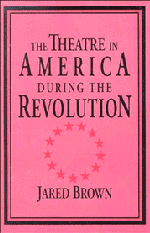Book contents
- Frontmatter
- Contents
- Preface
- Prologue
- SETTING THE STAGE: BEFORE THE REVOLUTION
- SETTING THE STAGE: BRITAIN ASCENDANT
- 5 The Drama of the Revolution
- 6 British Military Theatre, 1778–1779
- 7 British Military Theatre, 1779–1782
- SETTING THE STAGE: AMERICA ASCENDANT
- SETTING THE STAGE: AMERICA TRIUMPHANT
- Epilogue
- Appendix
- Notes
- Bibliography
- Index
5 - The Drama of the Revolution
Published online by Cambridge University Press: 29 September 2009
- Frontmatter
- Contents
- Preface
- Prologue
- SETTING THE STAGE: BEFORE THE REVOLUTION
- SETTING THE STAGE: BRITAIN ASCENDANT
- 5 The Drama of the Revolution
- 6 British Military Theatre, 1778–1779
- 7 British Military Theatre, 1779–1782
- SETTING THE STAGE: AMERICA ASCENDANT
- SETTING THE STAGE: AMERICA TRIUMPHANT
- Epilogue
- Appendix
- Notes
- Bibliography
- Index
Summary
As the battles between American and British forces were being waged, a number of plays were written reflecting the passions on both sides. Most of these dramas are aesthetically unsatisfactory, but they were not intended to be taken as works of art. Instead, like the plays written immediately before the Revolution, they were works of propaganda, calculated to confirm the opinion of the reader (if it agreed with the opinion of the playwright) and perhaps to sway the undecided. The characters are painted broadly, and their actions tend to be unequivocally good or irredeemably evil. Subtleties of characterization and dramatic structure are almost invariably sacrificed so that the playwright may create a clearer portrait of valor on the one side and cowardice or malice on the other.
Nor were most of the plays intended for staging. As Norman Philbrick has noted:
An interested reader who could not afford the price [of the pamphlet] probably took advantage of the opportunities for free reading supplied by the inns, barber shops, post offices, taverns, and coffee houses, where the latest prints were available.… [where] people met to read, to discuss the latest news of the day, and to argue the merits and consequences of actions in London and in the colonies. [Those who were unable to read] could be read to, as often occurred at public gatherings. And what is better designed for reading aloud than a play – an argument in dialogue?
- Type
- Chapter
- Information
- The Theatre in America during the Revolution , pp. 71 - 84Publisher: Cambridge University PressPrint publication year: 1995



